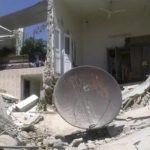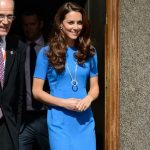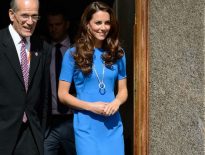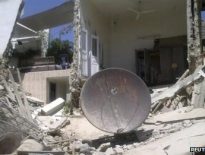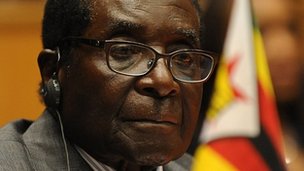
The European Union is to suspend most sanctions against Zimbabwe once it has held a credible referendum on a new constitution, EU foreign ministers say.
This would make an “important milestone” towards holding democratic elections, their statement said.
More than a 100 key individuals have been covered under an EU travel ban and assets freeze imposed in 2002.
But sanctions would remain against President Robert Mugabe, UK Foreign Secretary William Hague said.
The sanctions were originally imposed a decade ago in response to human rights abuses and political violence.
Mr Mugabe and his rival, Prime Minster Morgan Tsvangirai, have been sharing power since disputed elections marred by violence in 2008.
Fresh elections are expected to be held sometime next year, after the referendum on the new constitution.
Allies of Mr Mugabe have long argued that the sanctions should be unconditionally removed and that they have had a negative impact on Zimbabwe’s economy.
‘Important step-change’
“The EU agrees that a peaceful and credible constitutional referendum would represent an important milestone in the preparation of democratic elections that would justify a suspension of the majority of all EU targeted restrictive measures against individuals and entities,” the EU foreign ministers’ statement said.
It also welcomed the commitment of regional bloc the Southern Africa Development Community (Sadc) to resolving the political crisis in Zimbabwe.
Mr Hague said the decision was an “important step-change in the EU’s approach to Zimbabwe”.
“This approach will demonstrate to reformers across the political spectrum that the EU is serious about responding to concrete progress on the ground,” he said.
“It also puts the onus on the government of Zimbabwe to live up to their commitments. These decisions will be kept under constant review and if the situation deteriorates, we will of course not hesitate to respond appropriately.”
In February, the EU lifted some of its sanctions against top Zimbabwean officials, to support what it said was the power-sharing government’s “significant progress” on tackling the country’s economic crisis.
The BBC’s Africa correspondent Andrew Harding says the new constitution should make it much harder for President Mugabe’s supporters – or anyone else – to rig elections.
But there is still a great deal of concern that hardliners in Mr Mugabe’s Zanu-PF party may try to derail the entire process, he says.
For years they have blamed Western sanctions for Zimbabwe’s economic collapse; if those sanctions vanish – they lose one of their main rallying cries, our reporter says.


